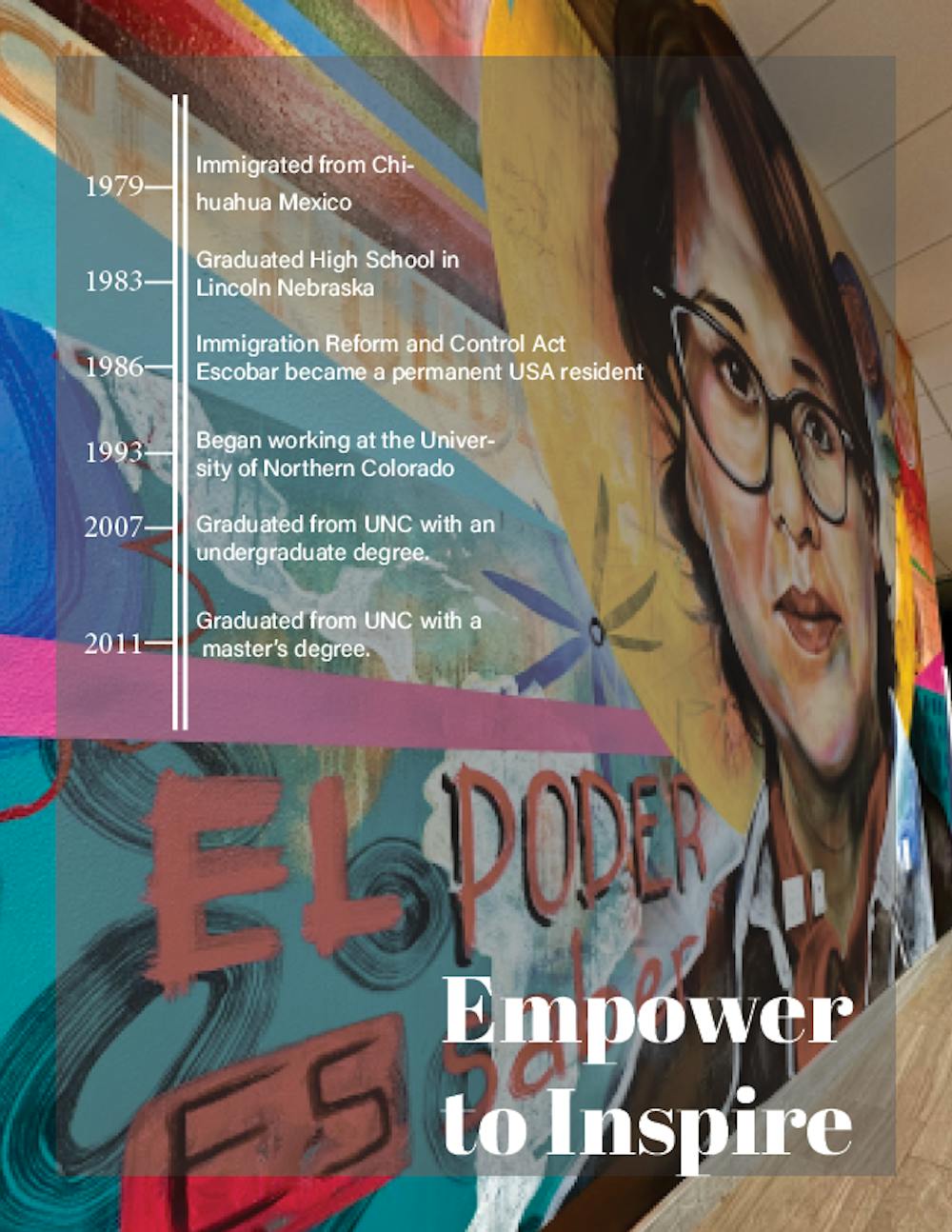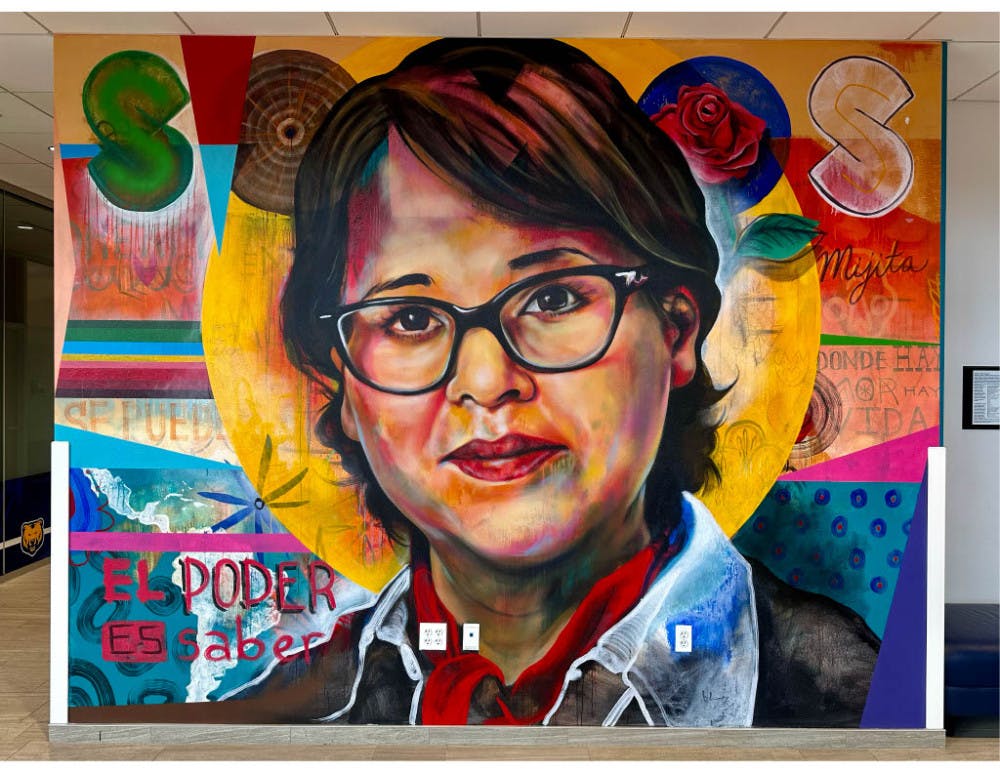In 1979, Patricia Escobar and her older sister stepped on a bus without a visa or legal papers to enter the United States of America. When immigration officials came onto the bus to check for legal papers, Escobar instantly fell asleep. Meanwhile, her sister borrowed a birth certificate from a stranger. The officials questioned her sister on the reason for their visit to theUSA, but her sister simply said they were going to visit their grandma.
Escobar was 13 when she migrated from Ciudad Juarez, Chihuahua, Mexico, to the United States with her family. In Mexico, Escobar’s family owed a lot of money to the little neighborhood stores. On various pieces of cardboard, the store clerk would write down how much they owed, which continued until they were in significant debt.

“It was desperation that drove my sisters and my dad to cross the border and then come to the United States to work,” Escobar said.
Escobar is the associate director of the César Chávez Cultural Center and has served as faculty in the Department of Hispanic Studies at the University of Northern Colorado.

Escobar left Mexico in the middle of eighth grade, turning 14 the first week she arrived in Denver. She recalled being popular and smart at her previous school in Mexico, but everything changed when she stepped foot in the United States. She said nobody understood her because she was not fluent in English and was forced to stop her education.
“That was a very difficult year I didn’t go to eighth grade because my parents didn’t know how to navigate the school system,” Escobar said.
Eventually, when Escobar and her family moved to Lincoln, Nebraska she was able to start ninth grade. Despite the language barrier and the lack of bilingual education, Escobar said she would force herself to get up every day and go to school because she loved learning.

It took Escobar about three to four months to understand 70-80% of English. She remembers going into tenth grade feeling confident about her English despite her friends making fun of her accent. She continued to make herself speak more and ended up appreciating the criticism from her friends.
“That’s the challenging part, getting over the fear of speaking,” Escobar said.
Escobar graduated high school in 1983. She recalls one counselor who suggested she apply to go to the University of Nebraska Lincoln.
“I was so excited,” Escobar said.
Escobar wanted to pursue a higher education, so she called her counselor to set up a time to start all the paperwork that had to be done. Her counselor picked her up to go to a café. They sat down and started the UNL application. When the application asked for her social security number, she told her counselor she did not have one. Escobar suggested she could make any random number up, but her counselor immediately disagreed with that idea. That’s when Escobar understood that college would be an impossible dream that she would never achieve.
“It was really disappointing to me,” Escobar said. “There was a very important driving force behind my decision to want to go to college. That was that my family struggled financially.”
In November of 1986, the Immigration Reform and Control Act was signed into law by President Ronald Reagan. This act offered legalization which led to lawful permanent residence for any undocumented immigrants who entered the United States before 1982.
Escobar’s family applied and were able to receive their documents. At this point, Escobar and her family were living back in Denver. Escobar worked at a cafeteria in the teach area of Denver Diner’s Club. Eventually, Escobar and her family ended up moving back to Lincoln, but this time she applied at UNL.
Escobar got into UNL and received a grant for $1,500. Despite everything she had been able to overcome, the doubt still plagued her. She said she would go door to door asking where the financial aid department was located on campus.
“I had the impostor syndrome like, ‘You must be the only one here who doesn’t know what a loan is,’” Escobar said with a laugh.
Throughout her college journey, she always remembered her mom saying “Preguntando se llega a Roma” which translates to “If you ask, you will get to Rome”. Escobar constantly reminded herself that by asking the right questions, she could get anywhere she desired.
Escobar completed three semesters and earned a 4.0 GPA. However, due to family financial issues, she was forced to drop out of college. She said she always regretted that decision.
“I could have finished my education but when you’re young… you don’t think sometimes. You don’t make good choices,” Escobar said.
Despite all the obstacles she faced to pursue a higher education. Escobar graduated in December of 2007 from UNC with a degree in Spanish and Mexican American Studies. She continued her education and earned her master’s degree in December of 2011. She graduated with summa cum laude in both degrees. This means she earned a 4.0 GPA.
“I’m a nerd,” Escobar said.
Escobar has now been working at the César Chávez Cultural Center for 31 years. She said the doors are always open for students to come in.
“My sense is that just like I was a first-generation low-income English language learner, all of these labels we were, or we are given,” Escobar said. “I understand that experience so well that I love to be able to empower students that have the same barriers I had.”
Cristina Cardenas, a UNC student, recalled the times when she struggled to focus in school and push forward. She said Escobar was the person that empowered her to continue her education.
“She has just been a role model to me,” Cardenas said.
Escobar said she believes that education is the great equalizer and is what we’ll get to propel forward.
“Information is knowledge and knowledge is power,” Escobar said.
This quote “Knowledge is power” translated to Spanish “El saber es poder” is written on a portrait mural that commemorates the 35th anniversary of the César Chávez Cultural Center. This mural is a portrait of Escobar and it’s located at Bear Central on campus.
At first, the center staff envisioned 35 years of the center’s existence compiled in one painting. In the end, students voted for Escobar’s portrait to be the mural.
“She’s become a pillar for the UNC Hispanic and Latinx community…she has stuck it through at UNC, helping out students for so many years,” said Leo Servin, a UNC student who is a psychology major.
Escobar sobbed as she remembered the mural unveiling. It was during Covid times when the phone rang. Escobar was sitting in a hospital chair by her husband’s hospital bed. He had contracted COVID and had become deathly ill and intubated.
“Of course, I see that mural, and the tears start coming because I have so much stuff that I’m going through,” Escobar said.
From 2021 to 2022, Escobar experienced the loss of many of her loved ones. Her sister passed away in 2021 from ovarian cancer. The following year her husband passed away, and before the end of the year, her adoptive son died from a car accident.
Escobar said she feels incredibly and humbly honored but feels like she doesn’t deserve to be the face of the mural.
“I feel like there are so many wonderful people here at the university that do great work,” Escobar said.
Escobar said that while she’s at UNC she will make the difference. She explained that the day she chooses to leave UNC it will be because she knows that she’s not doing a good job anymore or that there is someone who will do a better job. However, she would continue volunteering because her job is her passion.
“The stories that my students share with me, are stories that never leave me,” Escobar said. “I have a passion for the Latinx community.”






